- Home
- Trevor Scott
Cantina Valley (A Ben Adler Mystery Book 1) Page 3
Cantina Valley (A Ben Adler Mystery Book 1) Read online
Page 3
“Where do you think your brother went?” Ben asked.
“I don’t know,” she said. “His phone was part of a family plan with my parents. Because of that, we were able to call the service provider and determine the phone was either turned off or inoperable.”
Ben shrugged. “Maybe he’s shacking up with some woman. Or hanging out with some old Army buddies.”
She shook her head. “No. The last time we spoke he seemed different. He’s always been morose and moody, especially since his service in the Army overseas. But now he was upbeat and optimistic.”
“Isn’t that a good thing?”
“Yes, of course. But it didn’t seem real. It seemed forced.”
Ben sipped down the last of his rum, giving him time to consider Maggi McGuffin anew. Why was this beautiful woman not married off by now?
“What?” she asked.
“What what?”
“You’re staring at me funny.”
“I’m sorry,” he said. “I’m trying to figure out why you aren’t married.”
She sighed. “I was married for five years in my twenties. Until he cheated. So I let him go.”
“And now?”
“I have my work.”
“And your two cats,” he reminded her.
Maggi raised her right index finger. “One cat and a new kitten.” Now she finished the last of her rum.
“No boyfriend?”
“No.”
“Fuck buddy?”
“That’s awfully personal.”
“So, that’s a yes.”
“No.”
“I mean at forty, it’s understandable.”
“I’m thirty-five.”
She seemed only marginally sensitive to her age. Truthfully, she could have still passed for thirty.
He decided to direct a little traffic. “All right. Your brother, age thirty, suddenly gets happy and bugs out. As far as you know, he hasn’t taken up with a woman or reunited with old Army buddies. But you do have some idea where he might have gone. Why is that?”
“I didn’t say that,” Maggi responded.
“It was implied. You said that Colonel Keyes brought up my name only after you gave him reason to do so. Was that because of my military investigative background, or my physical location?”
“Yes.” Now she smiled at him.
“Both. Okay. Now we’re getting somewhere. You have reason to believe your brother is somewhere in this area of Oregon.”
“Yes.”
Now she was making a little more sense. “Still, I’m not sure how I can help you. I’m simply a hobby farmer.”
“But you were more than that,” she said.
“That was another life.”
“Please. I can pay you.”
Ben glanced about his modest house. “I don’t need money. I lead a simple life. Since my retirement from the military, I’ve spent almost none of my pay. I did have to upgrade some of my off-grid equipment. But everything I do now is bartered with my friends and neighbors.”
She pulled out her phone and found something on it. Ben knew she wasn’t pulling something from the net, since there was no way she could have service. “Perhaps I can help you with these people.” Maggi turned the phone for Ben to see what she had.
It was a copy of a certified letter from the IRS to Ben—a total pack of bullshit that he had cleared up in his mind nearly six months ago. But once the IRS got the sniff of blood they sunk their teeth into flesh like a great white shark. They didn’t like to be wrong, and Ben had proved that they were just that months ago. Now, he guessed, they were looking for any way to find something on him. He wasn’t sure how she had gotten a copy of the letter, though.
“Where’d you get that?” he asked her.
“I do background before hiring someone,” Maggi said.
“I told you I’m not for hire.”
“I can make this IRS matter go away.”
“I already told them to fuck off.”
She looked at the file on her phone. “I hear they’re ready to come out here with a full-blown audit.”
“I’ve done nothing wrong,” Ben said. “I do my taxes every year and report my military retirement income.”
“But that’s not the problem,” Maggi said. “It’s your other income.”
“I have no other income,” he said adamantly.
“The bartered goods.”
“I trade eggs for foul food.”
“Right. And the government wants their cut.”
“They can suck my dick if they think I’m going to quantify each trade I make.”
She shrugged. “I can make these people understand.”
Ben thought it over. He knew that if the IRS really wanted to screw him, they could garnish his military retirement income. He was saving that money for lean times, and to buy more silver.
“All right,” Ben finally said. “I’ll find your brother for your legal services. That sounds like a fair trade. You report that to the IRS any way you like. But they won’t hear shit from me.”
She smiled broadly now, like a little girl who just tricked her sibling into doing something nefarious.
5
The next morning Ben got up and did his chores—feeding his animals and collecting eggs from his chicken coop. He decided to hold off on smoking fish until he knew he had all day to keep shoving alder into the smoker.
Then, with two dozen fresh eggs, he drove down the road to one of his closest neighbors.
Maggi McGuffin had given him a folder on her brother, Tavis—everything from a list of old friends to information on his last known address. Of course that meant nothing now, since she had already gone to his old place in the Portland suburb of Beaverton and found out Tavis had moved out more than a month ago, leaving no forwarding address. The last time she had talked with Tavis he had mentioned something about a particular winery in the Southern Willamette Valley a few miles from Ben’s house. Technically the Springdale Winery was on the southern edge of Cantina Valley, whereas Ben lived in the northwest of the valley, where the Cantina Creek came down out of the Coast Range. Ben recently traded geese for a few cases of wine for a festival. They cooked a high-priced meal for rich folks from Eugene and Salem.
But before Ben went to the winery, he needed to talk with his neighbor. Ben pulled up to a locked gate and pressed a button, smiling for the high-tech camera. Without hearing anything from his neighbor, the gate clicked and slowly opened.
Ben put his truck in gear and spun his tires a little until they went from the unpaved county road to his neighbors newly-paved long driveway. The road was divided on both sides by ponds. The house was nestled into the hills of the Coast Range much like Ben’s place. But unlike Ben’s modest place, this two-story monster could have been featured in Architectural Digest. It was constructed of shiny logs with a second-story deck that wrapped around the entire upper level.
Standing at a covered entrance on the first level, Marlon Telford waved at Ben. The man was wearing only his underwear, his skinny body probably freezing with the temperature hovering around 32 degrees. The man’s most distinguishing feature was a long gray beard to his collarbone, tied off at the end in a tight braid. His head was shaved or naturally bald. Ben had once saw a picture of the man from his years as a college professor, where Marlon had hair like a mad scientist doing electrical experiments.
Getting out from his old truck with the two dozen eggs, Ben walked up to his neighbor. “I’d ask you how the hell it’s hanging, but I can see that from here.”
Marlon looked down and tucked himself in. “Sorry about that. I just got up. I was out Squatch hunting late last night.”
Marlon Telford was the area expert on everything Bigfoot. Not many knew how the man acquired all of his wealth, but he had plenty of it, considering his place and the fact that he owned a full section of land.
“Any luck?” Ben asked. Although he wasn’t a true believer, he liked to keep his mind open just in case someone foun
d one of the beasts.
“I got a few calls returned,” Marlon said.
Ben passed the two dozen eggs to Marlon. “Are you going to actually eat them this time?”
“You know I’m a vegetarian just like Bigfoot,” Marlon said.
“Then what do you do with the eggs?”
Marlon smiled and said, “I trade them for information. People in this area really like your eggs. Better than money.”
“I see. Tell me about a pretty redhead who came by in a black BMW yesterday.”
“I’m sorry about that, Ben. But I’m a sucker for a hot young lady.”
“She could have been someone from my past, Marlon.”
Marlon knew only as much about Ben as others in the area, with the exception of Jim Erickson, who had known Ben in his youth. Others only knew that he had done some covert activity in the military for more than 20 years. The truth was that Ben had made enemies with those under his investigation in the Air Force, as well as foreign bad guys. As a result, Ben liked his privacy.
“I know. I’m sorry, Ben. It won’t happen again. I forgot. What did she want?”
Ben wasn’t sure he wanted to share that information. Instead, he said, “She’s a friend of my old Air Force commander. Turns out my friend had a stroke and she wanted to inform me.” The truth without telling everything.
“I’m sorry. That’s a shame.” Marlon paused and then vectored. “Hey, when would you like to go on the hunt with me?”
“I’ve gotta smoke some fish and finish canning,” Ben said. “I’ve still got a deer tag to fill also. Let’s head out soon.”
Ben started to leave, but then stopped and pulled out a small photo that Maggi had given him. He showed it to Marlon and asked, “Have you seen this guy?”
Marlon squinted his eyes at the photo of Tavis McGuffin still with short military hair. Whereas Maggi’s hair was an auburn red, her brother’s hair was nearly black and flat on top. Or at least it had been. It could be as long as Ben’s hair by now. The former soldier was attempting to smile in the snapshot, but it came off as more of a knowing smirk.
“Never seen the guy,” Marlon finally said. “A friend of yours from the military?”
Before speaking, Ben slid the photo into a pocket inside his jacket. “No. A friend of a friend. I hear he’s come into an inheritance, so I’m tracking him down for that.” A little lie never hurt, Ben thought.
He wandered back to his old Ford pickup and sat for a minute gazing at the massive log house. Ben had never been inside, but he imagined it was just as impressive as the exterior. Although he didn’t expect Marlon to have seen Tavis McGuffin, few people slipped by without notice in this small community. Cantina Valley was like a living and breathing Italian mother. But where he was going next was a different story. Local wineries depended on mostly tourists for their living, although a staple of locals never hurt either.
Springdale Winery was another mile or so down Cantina Valley, set high on a hill with a view of both the vineyards below and the rolling green hills to the west. On a clear day the snowy peaks of the Cascades were also visible in the distance to the east. This was not one of those days.
Rain started to slap down on Ben’s windshield as he pulled into a nearly empty parking lot. Being a weekday in November, the tasting room was not open. But Springdale did maintain a small shop with wine and other related items available for purchase.
He sat and watched wispy clouds of fog roll over the tops of the green mountains to the west, as if apparitions on the haunt. Ben thought now about what he was doing. Did he really care about the IRS? They could be a problem for him, since they had no concept of his life. Yet, being an orphan was a freeing prospect for him. He no longer had parents to disappoint. And, perhaps, that had been his real reason for remaining in the military for twenty years. At least there he was not a failure. He had finally succeeded at something in the eyes of his superiors. Now, if things got to the point of total no return, he could end it all with one bullet.
As Ben stepped out of his truck, he adjusted his jacket over the handgun on his right hip and gazed down the mountain at a large flock of turkeys, the rain wetting his hair. Yeah, turkeys were dumb enough to not get out of the rain. But he guessed hunger would do that to any creature.
Ben was dating on and off a thirty-five-year-old woman who worked the wine trade, pouring to the masses during the summer and fall. Sonya had trained in Italy and France as a sommelier. When she spoke of wine Ben’s eyes glazed over. Either he liked it or he didn’t like it. No need to explain if he tasted pepper or the earth or the type of oak barrel. But Sonya was passionate about her work, and Ben liked anyone with passion. Especially when it came to beautiful women like Sonya.
He scurried into the retail shop to the side of the tasting room and shook off some rain from his jacket before wandering in deeper. The tasting room was an impressive rendition of an Italian wine cellar, with thick wooden ceiling beams and an oak bar fashioned from wine barrels past their useful life. The walls were textured and painted with a burnt cream like a Tuscan farmhouse.
An older woman, the co-owner of the winery, came out from the back and smiled at Ben. “How ya doing, young man? You looking for some wine or some Sonya?”
Coming in closer, he got a big hug from the owner. She was Italian and a big hugger. Then Ben pulled out his photo of Tavis McGuffin and showed it to her. But she hadn’t seen the man before. A lot of workers at wineries were hired under the table. Many were illegal. Some could have been hiding from their former lives.
“Who’s this man to you?” the owner asked him.
He decided to stick with the lie he had told Marlon, in case they ever compared notes. Then he added, “He’s not in trouble. A former soldier.”
Just then Sonya came out from the back office. She was wearing yoga pants and a green Oregon Ducks sweat shirt. On her feet, as always, were Nike running shoes. Besides her passion for wine, Sonya was also a big-time runner.
“I thought I recognized your voice,” Sonya said. “Were we supposed to do lunch?”
“No,” he said. “I was just delivering some eggs and thought I’d stop by and see you.” Not a total lie. He figured if anyone had seen Tavis out this way it was Sonya.
The older woman slipped back into the office area, leaving Sonya and Ben alone.
Now he hugged Sonya. He wasn’t sure about the current status of their relationship. Although she was on social media, he had never viewed her profile. Without a phone, they had to make dates the old fashioned way—well in advance.
She pulled back from him, but kept her hand on his free one. “You really should get a cell phone,” Sonya said. “Then I could give you a call before coming over.”
“As you know, there’s no service at my place.”
“You could get with the last millennium and have a landline installed.”
He didn’t want to tell her that the lines were already in place from when his parents lived there. But Ben had removed the lines from his house to the pole by his front gate. “Then I’d get all kinds of calls from telemarketers and asshole politicians.”
Sonya said something to him in French and he rolled his eyes and shook his head. Her heritage was recent Italian, with both of her parents emigrating to Oregon as college professors. So she had learned Italian organically as she grew up. The French and Spanish she had learned as a student at the U of O, when she wasn’t running for the Ducks track team. Ben insisted she spoke one of the three languages while they made love. She used French during foreplay and Italian during the actual act. Spanish was saved for her naughty side.
“What was that?” he asked her.
“I said, ‘What’s with the photo?’” Sonya explained.
He showed her the image of Tavis and said, “Have you ever run across this guy?”
She looked carefully and said, “Yes.”
“What? Seriously? When? Where?”
“Slow down cowboy. Why are you looking for him?”
> Instead of giving Sonya the story he had to the others, he came out with the truth. “A friend of my old commander asked me to find him.”
“A woman?”
“Yes, why?”
“What do you get in exchange?”
Considering they had never established exclusivity, Sonya was acting as if they were married. “She’s a lawyer from Portland. And has promised to deal with a little IRS matter.”
Sonya shook her head. “What about the EPA?”
“That’s bullshit!”
“So is the IRS matter, Ben. But the EPA can really fine you.”
“For collecting my own water on my property? Oregon is full of water. First the power company wanted me to direct my excess electricity back to the grid instead of storing it in my batteries, then the waste management people keep dropping off garbage cans and recycling bins—even though I never asked them to do so.”
“Recycling is important, Ben.”
“I understand that, Sonya. But I compost all of my yard debris and other organic waste. I don’t buy normal products with outrageous packaging, so I don’t collect cardboard and paper. What little I do have, I burn in my wood stove. That heats my house, along with the wood, which I cut from my own land. I bring my old wine bottles to you for recycling. Now the county tries to tell me which trees I can cut from my own land. And the water really pisses me off. I draw water into large cisterns during the winter months and use it for my garden in the summer. When the EPA says I can’t collect the water because it is owned by all of Oregon, that’s the last straw. The ground around my house is so saturated it’s like walking on a floating bog in my yard. Can you imagine how that would be if I let the water flow from my roof?”
Sonya stood with her arms crossed over her chest. She had heard his rants before. “I understand, Ben. But you have to deal with the government sometimes.”
“I dealt with the Air Force bureaucracy for more than twenty years. I’m done.”
“I’m just saying that maybe this lawyer could get the EPA off your back.”

 Without Virtue
Without Virtue Reaper Corps
Reaper Corps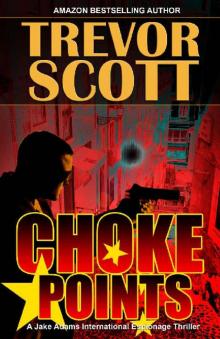 Choke Points
Choke Points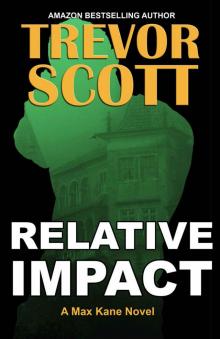 Relative Impact
Relative Impact![[Jake Adams 01.0] Fatal Network Read online](http://i1.bookreadfree.com/i/03/20/jake_adams_01_0_fatal_network_preview.jpg) [Jake Adams 01.0] Fatal Network
[Jake Adams 01.0] Fatal Network Extreme Faction
Extreme Faction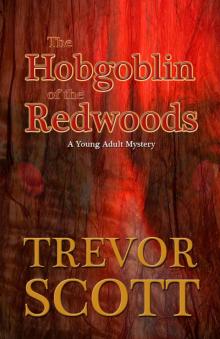 The Hobgoblin of the Redwoods
The Hobgoblin of the Redwoods Rising Tiger
Rising Tiger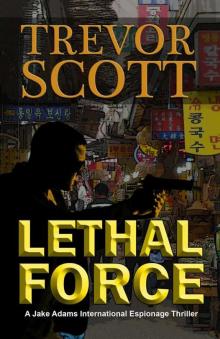 Lethal Force
Lethal Force Quantum Trigger
Quantum Trigger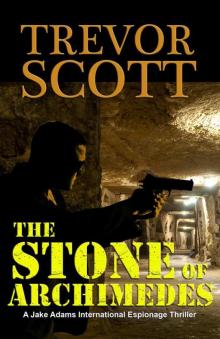 The Stone of Archimedes
The Stone of Archimedes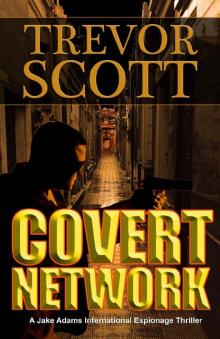 Covert Network (A Jake Adams International Espionage Thriller Series Book 14)
Covert Network (A Jake Adams International Espionage Thriller Series Book 14)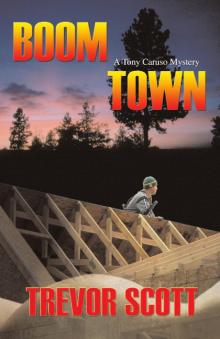 Caruso 01 - Boom Town
Caruso 01 - Boom Town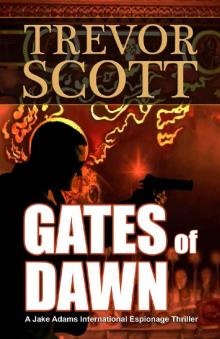 Gates of Dawn (A Jake Adams International Espionage Thriller Series Book 12)
Gates of Dawn (A Jake Adams International Espionage Thriller Series Book 12) Counter Caliphate (A Jake Adams International Espionage Thriller Series Book 11)
Counter Caliphate (A Jake Adams International Espionage Thriller Series Book 11) Counter Terror (A Jake Adams International Espionage Thriller Series Book 13)
Counter Terror (A Jake Adams International Espionage Thriller Series Book 13) Rise of the Order
Rise of the Order Fatal Accord
Fatal Accord Vital Force
Vital Force Without Options
Without Options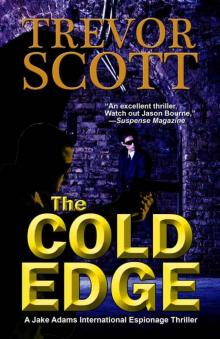 The Cold Edge
The Cold Edge The Dolomite Solution
The Dolomite Solution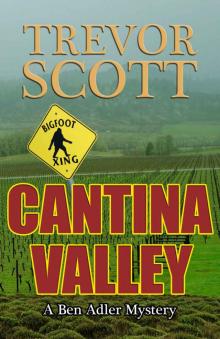 Cantina Valley (A Ben Adler Mystery Book 1)
Cantina Valley (A Ben Adler Mystery Book 1) Fatal Network
Fatal Network